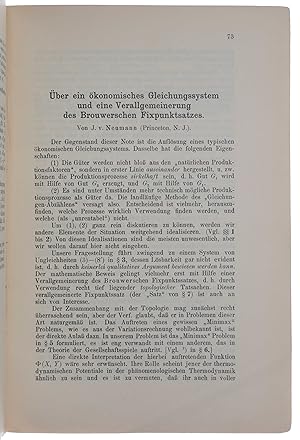About this Item
VERY RARE COMPLETE SET OF THE VIENNA ERGEBNISSE - GÖDEL ON LOGIC AND THE FOUNDATIONS OF MATHEMATICS VON NEUMANN ON MATHEMATICAL ECONOMICS. First editions, a very rare complete set in the original printed wrappers, of all eight issues of these proceedings to which Gödel contributed thirteen important papers and remarks on the foundations of logic and mathematics. The last three issues are particularly rare, and are important for containing several seminal papers on mathematical economics, notably von Neumann s "A model of general economic equilibrium" in Heft 8, which "E. Roy Weintraub, current President of the History of Economics Society, described as the greatest paper in mathematical economics that was ever written " (Cabral, p. 126). "In stark contrast to the short eight years of its existence, the colloquium that met in Vienna from 1928 to 1936 had a long lasting influence on economic theory" (Debreu winner of the 1983 Nobel Prize in Economics). The most important of the Gödel papers are perhaps Über Vollständigkeit und Widerspruchsfreiheit ( On completeness and consistency ) in Heft 3 and Zur intuitionistischen Arithmetik und Zahlentheorie ( On intuitionist arithmetic and number theory ) in Heft 4. Based on the lecture at the Colloquium required for his Habilitation, in the first paper Gödel presented a different approach to his epochal incompleteness theorem, published just a few months earlier in Monatshefte für Mathematik: instead of Russell s theory of types, in the present version he used Peano s axioms for the natural numbers; this soon became the standard approach. In the second paper, Gödel proved that intuitionist mathematics is no more certain, or more consistent, than ordinary mathematics. "By invitation, in October 1929 Gödel began attending Menger s mathematics colloquium, which was modelled on the Vienna Circle. There in May 1930 he presented his dissertation results, which he had discussed with Alfred Tarski three months earlier, during the latter s visit to Vienna. From 1932 to 1936 he published numerous short articles in the proceedings of that colloquium (including his only collaborative work) and was co-editor of seven of its volumes. Gödel attended the colloquium quite regularly and participated actively in many discussions, confining his comments to brief remarks that were always stated with the greatest precision" (DSB XVII: 350). Von Neumann also attended the colloquium in the early years. Although subsets of this collection occasionally appear on the market, complete sets of all eight issues are extremely difficult to find. Working under Hans Hahn, Karl Menger (1902-85) received his PhD from the University of Vienna in 1924 and accepted a professorship there three years later. "During the academic year 1928/29, several students asked Menger to direct a Mathematical Colloquium, somewhat analogous to the philosophically motivated Vienna Circle . This Colloquium, which met on alternate Tuesdays during semester time, had a flexible agenda including lectures by members or invited guests, reports on recent publications and discussion of unsolved problems. Menger kept a record of these meetings, which he published, regularly in November of the following year, under the title Ergebnisse eines mathematischen Kolloquiums … "Gödel had entered the university in 1924, and Menger first met him as the youngest and most silent member of the Vienna Circle. In 1928, Gödel started working on Hilbert s program for the foundation of mathematics, and in 1929 he succeeded in solving the first of four problems of Hilbert, proving in his PhD thesis (under Hans Hahn) that first order logic is complete: Any valid formula could be derived from the axioms. "At that time Menger, who was greatly impressed by the Warsaw mathematicians, had invited Alfred Tarski to deliver three lectures at the Colloquium. Gödel, who had asked Menger to arrange a meeting with Tarski, soon took a hand in running the Colloquium and editing.
Seller Inventory # 5970
Contact seller
Report this item



